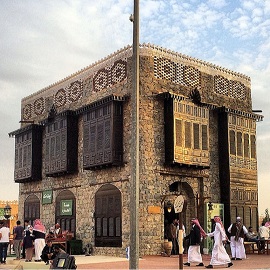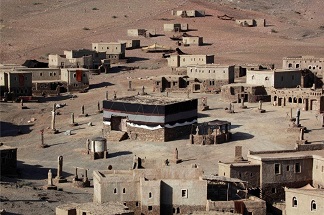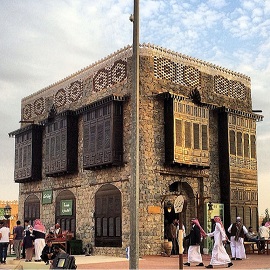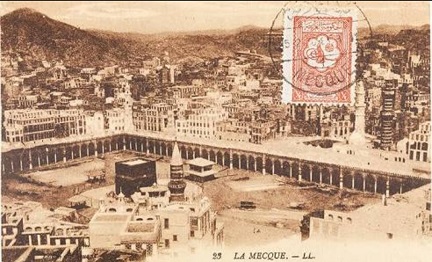
A GENTLEMEN'S CLUB IN MEDIEVAL MECCA: HILF AL-FUDUL
Sources indicate that Prophet Muhammad was informed of his prophethood at the age of 40. According to Islamic belief, Prophets are free from all sins and faults, and they are distant from any wrongdoings. Before his prophethood, the Prophet was esteemed as the most noble, with the best character, the most honorable lineage, the kindest neighborly and familial relations, the highest intelligence and wisdom, and he stood as the epitome of honesty and justice within his community, embodying the highest moral standards. He earned the nickname "Muhammad al-Amin" (Muhammad the Trustworthy) due to his unwavering integrity and honesty. During this period, a significant event took place in Mecca that holds importance in the history of justice.

O Sons of Fihr!
Mecca, where the noblest tribe of the Arabs, the Quraysh, lived, was not only more advanced than other sites in Arabia in terms of trade during those years, but also held greater honor due to its hosting of the Kaaba. Every year, it would host numerous people from all around for both trade and pilgrimage to the Kaaba, thus further enhancing the power and prestige of Mecca.
A man from the Zubaid tribe of Yemen brought goods to Mecca for sale in Dhu al-Qadah, one of the four sacred months when fighting is prohibited. He sold them to Al-As ibn Wa'il, a notable figure from the Quraysh tribe. However, Al-As ibn Wa'il not only failed to pay for the goods but also refused to return them.
This time, the unfortunate man approached prominent members of influential families in Mecca, such as Abd al-Dar, Makhzum, Cum’an, Sahm, and Adiyy bin Qaab. However, instead of assisting the man, they sided with Al-As ibn Wa'il, reprimanded the man, and turned him away.
Feeling helpless, the man climbed Mount Abu Qubays and recited a poignant poem that began with "O sons of Fihr!", expressing the injustice he had suffered. At that moment, among those sitting in groups around the Kaaba, one person stood up and offered to help the oppressed individual. This person encouraged others to join in supporting the cause. This individual was none other than Al-Zubayr, the uncle of the Prophet Muhammad.

Until the Seas Dry Up ...
The sons of Hashim, Muttalib, Zuhrah, Taym, and Harith ibn Fihr from the Quraysh tribes gathered at the Dar al-Nadwa, where the administration of Mecca was discussed. They decided to hold a meeting at the house of Abdullah ibn Jud'an, an elderly, wealthy, and influential figure from the Taym tribe, to discuss their course of action in this matter. They excluded anyone who did not support aiding the man from Yemen. At that time, Prophet Muhammad, in his twenties, was also present there with his uncles.
Abdullah ibn Jud'an first hosted a feast for them. Then, they made a pact among themselves to support those who faced oppression among the residents of Mecca or foreigners who came to Mecca and to continue striving until the rights of the oppressed were restored from the oppressors. They solemnly swore that they would remain committed to this pact "as long as there is a bit of water in the oceans to moisten a hair and as long as the mountains of Hira and Sabir stand where they are and wild mountain goats graze upon them." To reaffirm their commitment, they drank from the Zamzam water with which they washed the Black Stone, Hajar al-Aswad.
In the past, three individuals from the Jurhum tribe, all named Fadl and members of the nobility—Fadl ibn Fadala, Fadl ibn Wada'a, and Fadl ibn Kharith—came together and made an agreement. They pledged to help the oppressed against the oppressor, to uphold the rights of the weak against the powerful, to protect strangers in their midst, and, in essence, to establish justice.
Indeed, to commemorate their memory, the agreement made in Abdullah ibn Jud'an's house was named "Hilf al-Fudul" (The Pact of Fadls). "Fadl" carries the meaning of excellence, and at the same time, it signifies surplus, referring to the right of the oppressed over the oppressor.

Oh, I wish
This gentlemen's agreement became very popular in Mecca. It is even well-known that Utbah ibn Rabi'ah, the father-in-law of Abu Sufyan, was deeply saddened that he couldn't participate in it. He is known to have said, "If they had asked me to leave my family and lineage to join this group, I would have done so."
The first action of Hilf al-Fudul was to retrieve Zubaidi's property from Al-As ibn Wa'il and return it to its rightful owner. At that time, a man from the Khath'am tribe had come to Mecca with his daughter named Qatul for the purpose of Umrah or Hajj pilgrimage. Qatul was exceptionally beautiful. As soon as Nubayih ibn Hajjaj, a notable from Mecca, saw her, he fell in love and abducted the girl.
When the distressed man began to cry out, they advised him to present his case to Hilf al-Fudul. Standing by the Kaaba, the man started shouting, "Oh Hilf al-Fudul, come to my aid!" Suddenly, warriors with drawn swords appeared from all directions. Upon learning the situation, they headed to Nubayih's house. Nubayih was about to say, "If only she had stayed the night!" But they responded, "She wouldn't even have enough time to milk a goat." They promptly took the girl from him and returned her to her father.
A member of the Sumale tribe had sold goods to Ubay ibn Khalaf in Mekke, but when he couldn't collect his payment, he turned to Hilf al-Fudul for help. They went to Ubay and threatened that if he didn't pay the money, they would take action themselves. Fearing the consequences, Ubay reluctantly paid the debt.
Prophet Muhammad later said about Hilf al-Fudul, "I would not exchange my participation in that pact for any number of red camels. Even now, if I were invited to it, I would accept."
Abu Jahl, pay the money!
Even after the emergence of Islam, the influence of Hilf al-Fudul continued. Abu Jahl didn't pay the money he owed to a member of the Erash tribe from whom he had purchased goods. A polytheist who knew Abu Jahl's enmity towards Prophet Muhammad, sent the man to Prophet Muhammad at the Kaaba as a mocking gesture. Prophet Muhammad, accompanied by the merchant, went to Abu Jahl and asked for the money; Abu Jahl immediately paid the money.
A merchant from Zabid brought goods to sell in Mecca, and Abu Jahl offered a low price for the goods, instructing others not to offer a higher price. Upon learning of the situation, Prophet Muhammad purchased the goods from the merchant at the weight of three camel loads, paying the price he had requested. He also reminded Abu Jahl of Hilf al-Fudul and cautioned him accordingly.
During the early years of the Umayyad caliphate, a dispute arose between the governor of Medina, Walid ibn Utbah, and Husayn ibn Ali over a matter related to property. When Hazrat Husayn mentioned that he would refer the matter to Hilf al-Fudul, Walid apologized and withdrew his claim.
New members were not accepted into Hilf al-Fudul. After the era of the Four Caliphs, the individuals belonging to this group passed away. Moreover, with the establishment of an Islamic state in Medina and the implementation of effective institutions to ensure justice and security, the purpose of Hilf al-Fudul was fulfilled. Thus, this gentlemen's club established in medieval Mecca faded into history.
Önceki Yazılar
-
“FASTING WAS MADE OBLIGATORY ALSO UPON THOSE BEFORE YOU”25.02.2026
-
WHAT WAS THE LAW OF THE OTTOMAN EMPIRE?18.02.2026
-
WOMAN IN THE EASTERN WORLD11.02.2026
-
THE OTTOMAN DYNASTY OWES ITS LIFE TO A WOMAN4.02.2026
-
THE WATER OF IMMORTALITY IN THE “LAND OF DARKNESS”28.01.2026
-
THE WORLD LEARNED WHAT FORBEARANCE IS FROM SULTAN MEHMED II21.01.2026
-
THE RUSH FOR GOLD14.01.2026
-
TRACES OF ISLAM IN CONSTANTINOPOLIS7.01.2026
-
WHO CAN FORGIVE THE KILLER?31.12.2025
-
WHEN WAS PROPHET ISA (JESUS) BORN?24.12.2025